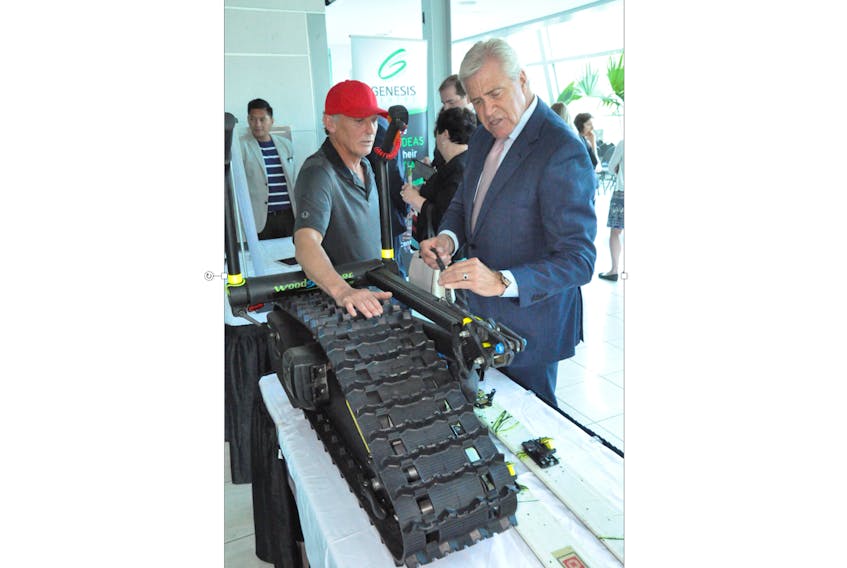The federal government announced a nearly billion-dollar investment in the people of Newfoundland and Labrador on Friday.
Over the next six years, Ottawa will spend $949 million through a pair of labour agreements that are aimed at increasing the jobs and skills training available to people in this province so that more citizens — especially those under-represented in the workforce such as women, immigrants, Indigenous peoples, and those with physical or intellectual disabilities — can avail.
“It’s not a big Canadian solution, it is Newfoundland and Labrador specific and more important it’s community and regionally specific. So, what jobs are in your particular community, how can we be responsive to that, how can we get you to adapt to those jobs and to the marketplace,” said Seamus O’Regan, MP for St. John’s South—Mount Pearl and the province’s federal cabinet minister.
“When government is more nimble and smarter in how it goes about things, people benefit. People can get jobs easier and they will be better equipped for the jobs of the future.”
Premier Dwight Ball lauded the feds’ move, particularly how it isn’t a per capita agreement.
“When you look at transfer payments and most agreements that we see between the federal government and the province, it really comes down to how many people do you have living in your jurisdiction,” the premier told reporters.
“It goes beyond that. It goes to the need of Newfoundlanders and Labradorians and, as Seamus (O’Regan) said, the flexibility that employers, that employees need.”
The new Workforce Development Agreement (WDA) — which consolidates the Canada Job Fund Agreements, the Labour Market Agreements for Persons with Disabilities and the Targeted Initiative for Older Workers, the latter of which expired last March — will see $26 million invested over the first two years.
It's not a big Canadian solution, it is Newfoundland and Labrador specific and more important it's community and regionally specific.
— Seamus O’Regan
That money will be used to deliver training in basic skills, on-the-job training and workplace-based skills upgrading, work placements for people with intellectual disabilities, employment counselling and services, and employer-sponsored training.
The amended Labour Market Development Agreement (LDMA) — a six-year $1.8-billion initiative introduced in the 2017 federal budget and sending $218 million to the province to administer over the next two years — is targeted at ensuring the workforce has the skills employers need but it will also expand on the eligibility requirements for employment benefits and support measures under the Employment Insurance Act, to the benefit of both employees and employers.
Where before funding through the LDMA only allowed for EI claimants to benefit from support, the newly inked deal will make it available to anyone — employed or unemployed — who’s contributed to EI in five of the past 10 years.
“That opens it up to a lot of part-time workers, it also opens it up to a lot of people with disabilities who are in the workforce,” O’Regan explained. “They’ll be able to avail of that training, either from agencies who are already doing good work on the ground or from employers themselves.”
It also allows for employers, employer associations, community groups and communities develop and implement strategies for dealing with labour force adjustments and meeting their human resources needs.
The Newfoundland Aquaculture Industry Association has already scored funding through the program and are using it to launch a labour market study, training capacity review and a recruitment retention strategy this September.
Executive director Mark Lane says the next step is about developing materials to help get the message out about the careers available in the fastest-growing food production industry in the world. It’s about more than just feeding fish.
“We need veterinarians, we need engineers, we need mechanics, we need communications people, lawyers, all that sort of thing,” said Lane. “We want to get the message about how advanced our industry is that we can enable people to do something they love to do in a place they love to live, their hometown, whether it’s Gaultois, Belleoram, Triton, or other places.”
The Genesis Centre, the province’s award-winning innovation hub for tech startups and host for the billion-dollar announcement, also have an early piece of the pie.
The organization has $500,000 to help work with new firms led by female and foreign founders, as well as other minority groups — $150,000 of which will be allocated to a seed fund that awards $10,000 to five companies each year over three years, allowing them to grow their business through increased research and development and staffing.
“It will allow us to do some research of what’s happening elsewhere around the world in places that are hotbeds of innovation like Chile, San Francisco and others. We’ll be able to look to them and see what they’re doing and what their best practices are for working with women, working with immigrants and other minority groups and we’ll be able to bring those best practices back and better education ourselves and better develop programs to be able to implement here.”
Both the province and Ottawa are keen to measure the performance of its new employment initiatives.
“We’ll have an understanding of where the priorities should be, we’ll have an understanding of who availed of these opportunities, we’ll understand how effective it’s been and where maybe we should put more towards something else that’s proven to be more effective,” O’Regan said. “That will only allow us to improve these counselling services as we go along.”
Twitter: kennoliver79
Note: This is a corrected version of the story. Minister O'Regan stated during interviews with the media that EI claimants had to have paid the minimum into EI in the last 5 years to qualify. A press secretary for the Office of the Minister of Employment, Workforce Development and Labour clarified that claimants had to pay in five of the last 10 years.









